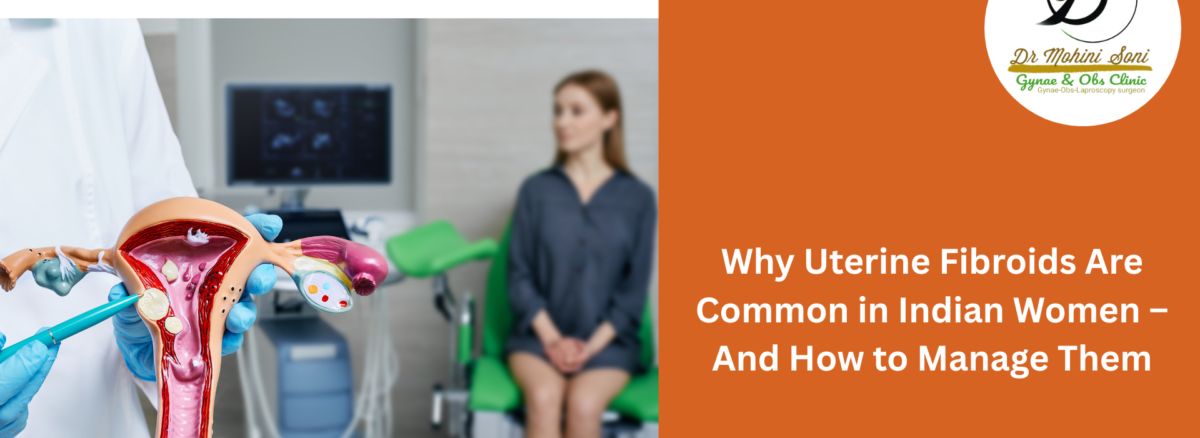Uterine fibroids are non-cancerous growths that develop in or around the uterus, and they are surprisingly common among Indian women. While many fibroids don’t cause noticeable symptoms, others can lead to heavy bleeding, pelvic pain, frequent urination, and fertility issues. Understanding why fibroids occur more frequently in Indian women—and how to manage them—is essential for early intervention and better reproductive health.
What Are Uterine Fibroids?
Uterine fibroids, also known as leiomyomas, are benign tumors made of muscle and fibrous tissue. They can vary in size—from as small as a seed to as large as a grapefruit. While the exact cause is still unknown, certain factors increase the risk, including hormonal imbalances and genetics.
Why Are Fibroids So Common in Indian Women?
Several factors contribute to the high prevalence of uterine fibroids in Indian women:
- Hormonal Imbalance
Estrogen and progesterone, the hormones that regulate the menstrual cycle, play a major role in fibroid growth. Many Indian women experience hormonal imbalances due to stress, lack of physical activity, poor sleep, and irregular eating habits—all of which can contribute to fibroid development. - Genetics
Family history plays a key role. If your mother or sister had fibroids, you are more likely to develop them. This pattern is often observed in Indian households, where genetic predisposition is common. - Delayed Pregnancy
With more Indian women focusing on careers and education, pregnancy is often delayed. Fibroids tend to grow during the reproductive years, and late pregnancies or not conceiving at all can increase the risk. - Diet and Lifestyle
High intake of refined carbohydrates, processed foods, and lack of essential nutrients in traditional Indian diets may also promote fibroid growth. Obesity, another rising concern in urban India, is also linked to higher fibroid risk. - Vitamin D Deficiency
Studies show that Vitamin D deficiency, prevalent among Indian women, may be associated with fibroid development. Limited sun exposure, especially in urban settings, contributes to this deficiency.
Common Symptoms of Uterine Fibroids
- Heavy or prolonged periods
- Pelvic pain or pressure
- Frequent urination
- Lower back pain
- Pain during intercourse
- Difficulty conceiving
Many women mistake these symptoms for routine menstrual discomfort, which often delays diagnosis.
How to Manage Uterine Fibroids
The good news is that fibroids are manageable. The right treatment depends on the size, location, and symptoms.
- Lifestyle Modifications
- Maintain a healthy weight
- Incorporate physical activity
- Eat a balanced, fibre-rich diet
- Reduce stress through yoga and meditation
- Medications
Your gynecologist may prescribe hormonal therapy, pain relievers, or iron supplements if you’re experiencing heavy bleeding or anemia. - Minimally Invasive Procedures
Procedures like uterine artery embolization or laparoscopic myomectomy are commonly recommended for moderate to large fibroids that are causing symptoms. - Surgical Options
In severe cases, hysterectomy (removal of the uterus) may be advised, especially if other treatments haven’t worked and symptoms are significantly affecting your quality of life.
When to See a Gynecologist
If you have heavy bleeding, persistent pelvic pain, or are trying to conceive without success, it’s essential to consult a gynecologist. Early diagnosis can prevent complications and help you explore less invasive treatment options.
Conclusion
Uterine fibroids may be common in Indian women, but they don’t have to control your life. Awareness, regular check-ups, and timely medical guidance can make all the difference. If you’re experiencing symptoms or have a family history of fibroids, don’t ignore the signs. Managing your reproductive health starts with listening to your body.
Looking for expert care in Delhi?
Consult Dr. Mohini Soni, trusted gynecologist in Vasant Kunj, for personalized fibroid diagnosis and treatment options.
Visit: drmohinigynecologist.com : Book Appointment
FAQs
- Are uterine fibroids dangerous?
Fibroids are usually non-cancerous, but if left untreated, they can lead to complications like anemia or fertility issues. - Can uterine fibroids affect pregnancy?
Yes, depending on their size and location, fibroids can interfere with conception and pregnancy. Early evaluation helps reduce risks. - Can fibroids shrink on their own?
Some small fibroids may shrink after menopause when hormone levels decline. Others may need medical intervention. - Is surgery the only solution for fibroids?
No. Medications, hormone therapy, and non-surgical procedures can often help. Surgery is considered when symptoms are severe or other treatments fail. - How can I prevent fibroids?
While not always preventable, maintaining a healthy lifestyle, managing stress, and getting regular check-ups can reduce your risk.

